Backyard chicken eggs taste great poached, sunny side up, scrambled, or as an omelet. However, you’re not the only one who loves eating eggs. Several animals will gladly eat the eggs in your chicken coop.
Below is a list of these sneaky animals that will gladly eat your chicken’s eggs if given a chance.
#1 Weasels
A weasel’s diet consists of small mammals, reptiles, amphibians, birds, and their eggs. Weasels are known to enter chicken coops and will even kill chickens for food.
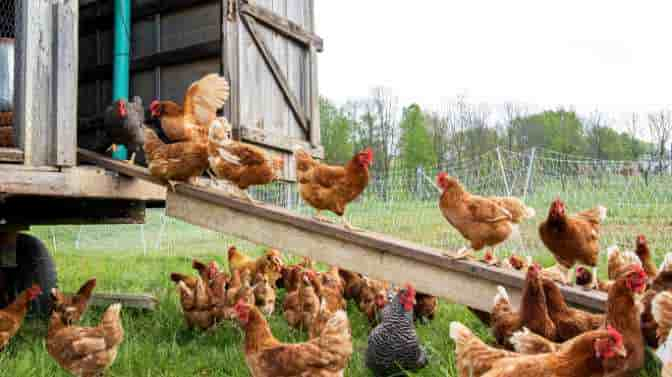
These pests will try to access the coop by digging under the coop walls. They can easily fit through cracks and holes as small as an inch in diameter.
#2 Foxes
These wild dogs are notorious for stealing both chicken eggs and chickens. It’s not unusual for them to eat or cache chicken eggs from nests.
Foxes can jump up to 15 feet in the air and climb fences. However, if they’re getting into your chicken coop, they’re likely digging a hole under the fence or coop wall.
#3 Rats
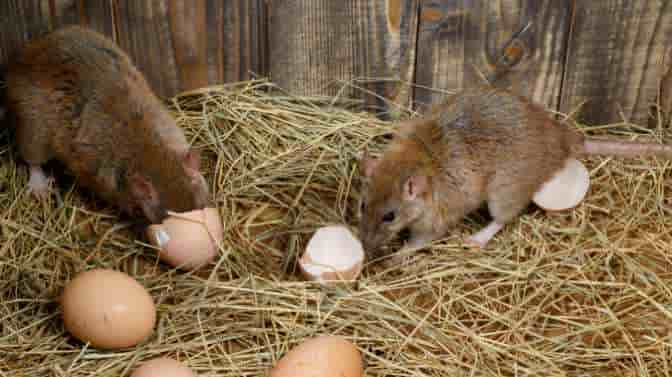
If you have a rat problem in your chicken coop, it’s because they’re looking for an easy meal. Rats are known to eat almost anything, and chicken eggs are no exception.
Rats will try to access the coop through small cracks, holes or any other opening they can find. Once they’re in, they’ll feast on your chicken’s eggs.
To keep rats out of your chicken coop, seal any cracks or holes. Avoid using rat poison, as it can harm your chickens if they eat it.
#4 Blue Jays
Blue jays are birds of prey, meaning they hunt and eat other animals. While they typically eat insects, rodents, and small reptiles, they will also eat chicken eggs.
Blue Jays may be visiting your yard for more than the bird feeders. These birds are known to watch chickens and wait for the opportunity to steal their eggs.
They are omnivores that hunt more than they eat, and while it’s doubtful, they will kill a fully grown chicken. However, young chickens and eggs are a different story.
Avoid hunting or trapping the birds; the Federal Migratory Bird Treaty Act protects Blue Jays, like hawks. So your only option is to scare them away or keep your chicken coop well-secured.
To keep blue jays out of your chicken coop, you’ll need to cover the chicken run with wire mesh. The mesh should have small enough holes that the birds can’t get through.
You can also try hanging shiny objects from the chicken coop or run. The reflection from these objects may help deter the birds.
#5 Opossums
Opossums are omnivores that will eat just about anything, including eggs and your birds. These sneaky critters will kill and eat an entire grown chicken. They won’t eat the whole chicken, but it will usually eat the crop and abdomen areas in the coop.
Opossums are nocturnal animals that will visit your chicken’s coop at night. Unfortunately, this is when your birds are more vulnerable and likely to be killed.
#6 Crows
These black birds are sneaky, brilliant, and sneaky. They have been known to watch farmers and wait for the opportunity to steal their chicken eggs.
Like ravens and rooks, they are a part of the Corvid family. These birds are extremely intelligent, rivaling apes and dolphins. Crows can make use of tools to help them access food. Their amygdala, thalamus, and brain stem enable them to recognize human faces.
This makes them a real problem for backyard birds. If a crow sees you taking care of your chickens, they’ll likely remember your face and return when you’re not around.
The crows will go into the coop and remove the eggs from the nest boxes. Some chicken owners have experienced Blue Jays, and crows dive bombing their chicks. Free-range chickens are more susceptible to this.
You can keep crows away by using a scarecrow, loud noises, or shiny objects. You can also try to cover the chicken coop with wire mesh. The mesh should have small enough holes that the birds can’t get through.
#7 Housecat
If your cat loves hanging around the coop, you may need to watch her closely. Barn cats are great for catching mice, but they can also kill your chickens and eat the eggs.
While most cats will only eat the occasional chicken, some will make a meal from your birds. This is especially true if the cat is hungry or has kittens to feed. Cats are predators with an instinct to hunt.
It’s hard to train a cat to stop stealing eggs. Before you give your cat to the animal shelter, make sure you’re feeding her enough. A full stomach will usually keep a cat from hunting. Domestic cats do best on a diet that is rich in meat.
Playing with her daily will satisfy her natural hunting instincts. A fishing pole-type toy with feathers or a small animal on the end of the line can be a great way to keep your cat entertained and away from the chicken coop.
#8 Snakes
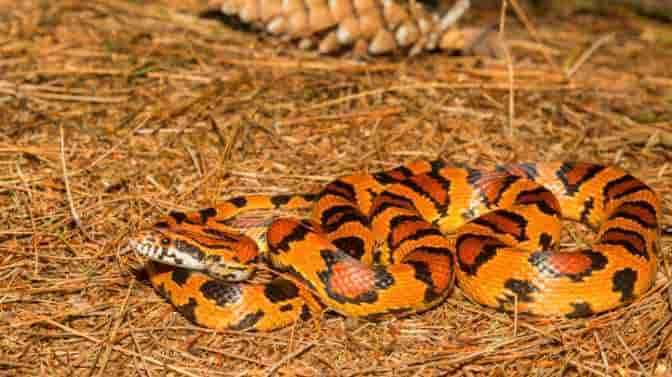
If you’ve noticed an unusual number of snakes slithering around your yard, chances are they’ve made their way into the chicken coop. These reptiles can climb trees, fences, and whatever gets them closer to their next meal – your chickens.
While not all snakes eat eggs, rat snakes are the most common. These predators raid nests during the night and are widespread in North America. They can grow to be over six feet long and are excellent climbers.
Believe it or not, snakes are not attracted to the coop for your birds or their eggs. Instead, they likely stumbled upon the coop while searching for shelter, food, and w
To keep snakes out of the chicken coop, you’ll need to cover the chicken run with wire mesh. The mesh should have small enough holes that the snakes can’t get through. You may also want to consider using a snake repellent around the perimeter of your property.
There are a variety of snake repellents on the market, but the most effective contain naphthalene or sulfur. You can also try using mothballs around the chicken coop. Mothballs are toxic to snakes and will keep them away from the area.
#9 Hedgehogs
Hedgehogs are natural predators that won’t invade your coop for the eggs but will kill your hens and chicks if given the opportunity. These animals are not native to the United States but can be seen living in Africa, Central Asia, the Middle East, and Europe.
Hedgehogs are nocturnal animals that sleep during the day and hunt at night. Their diet consists of snails, worms, plants, and beetles, but they will also eat small mammals or baby mammals.
#10 Racoons
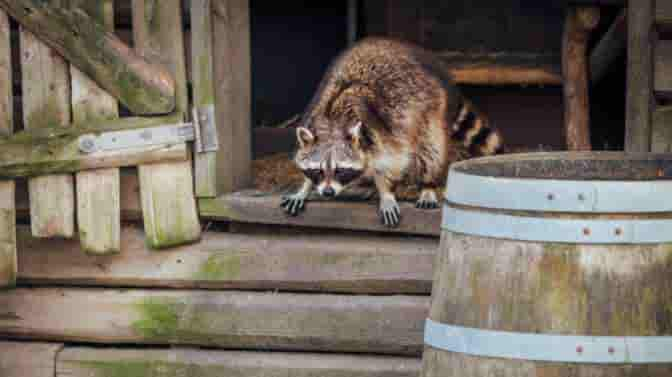
Raccoons not only love eating chicken eggs but will all kill and eat your birds. A single raccoon can wipe out an entire flock of chickens in a relatively short period.
These animals are very intelligent and have nimble fingers that can easily open chicken coops. They will also remember how to get into the coop, even if you’ve changed the locks. Raccoons are primarily nocturnal animals, but it’s not unusual for them to search for food during the day.
If you’re having a raccoon problem, you must take action immediately. Start by securing the coop like a fortress. Then use ammonia or cayenne pepper around the edges of your property or yard. Raccoons don’t like the smell of either one of these, which will keep them away.
You can also try using a live trap to catch the raccoon. Once you’ve caught the animal, you can either release it into the wild or contact your local wildlife rehabilitation center.
#11 Magpies
Magpies are scavengers and will eat just about anything they can find. This includes chicken eggs and young birds. These black and white scavengers will steal the eggs from nest boxes and chicken coops.
They love the bantam-sized chicken eggs because they easily fit in their beaks.
However, they will gladly steal New Hampshire and Jersey Giant eggs, but they will have trouble carrying the eggs off. So don’t be surprised if you find them eating the bigger eggs in the nest boxes.
If you don’t see them eating the eggs, you’ll likely find leftover pieces of the eggshells near the chicken coop or nest boxes. The best way to keep magpies away from your chickens is to scare them off.
#12 Stoat
Stoats are small, weasel-like animals that are found in Europe, Asia, and North America. These predators kill chickens for food, but they’re also known to kill chickens for fun.
Stoats are carnivores that eat small mammals, such as rabbits, mice, and hamsters. They aren’t picky eaters and eat almost any small animal, including chickens. While they won’t steal your chicken eggs, they will massacre your chickens, which supply the eggs.
#13 Mink
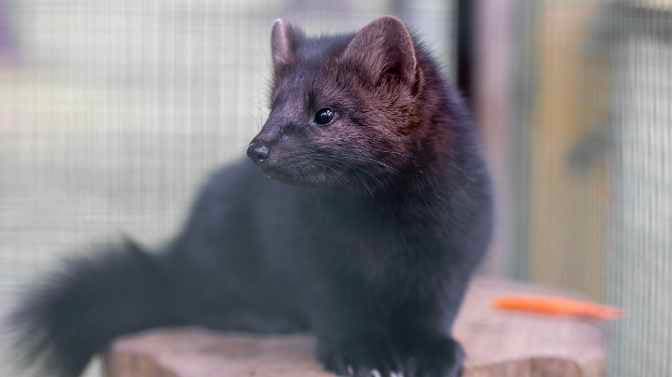
Minks will eat poultry as well as eggs. These dark-colored mammals are carnivores that hunt and eat insects, muskrats, frogs, fish, and even chickens. It’s not unusual to see a mink in your backyard unless you reside in Arizona (they don’t live there).
Minks rely on their keen sense of smell to find food. So they attack the back side of the neck when hunting chickens, ducks, or other big prey.
They access coops through small gaps and holes. Minks are also excellent diggers and will dig their way into the coop if given the opportunity.
You can keep minks away from your flock by using wire mesh that’s one-half inch or less. The wire mesh should be buried at least one foot underground and extend out another foot above the ground. This will create a barrier the mink can’t dig under or climb over.
#14 Bears
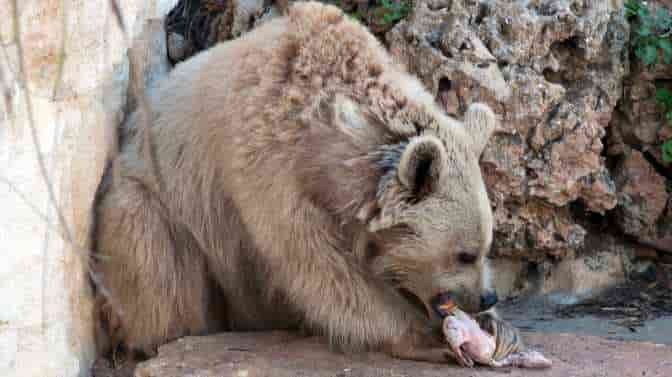
Bears have lost nearly 60% of their territory due to human encroachment. Unfortunately, this means they’re coming into contact with humans more often, which can lead to problems. One of those problems is chicken theft.
Bears are known to eat just about anything, including chickens and their eggs. Adult males can weigh up to 600 pounds, and females up to 350 pounds. Meaning they can easily break a chicken coop to pieces.
If you have a bear problem, an electric fence is the only way to stop them. In some states, it is illegal to shoot them, even in your backyards, unless it is hunting season and you have the proper license.
#15 Dogs
Having a dog to protect your chickens can be great. However, once your dog discovers how great the eggs taste, they will start to steal them. This is not good as the eggs can expose the dog to salmonella, and you’ll find broken eggs daily.
Secure the chickens in a pen to prevent your dog from stealing the eggs. Another option is to spray the eggs with a bitter apple spray. This will discourage them from eating the eggs.
You can also train your dog to leave the eggs alone. This will take some time and patience, but it can be done. Start by teaching them the “leave it” command and move on from there.
Of course, some breeds will be easier to train than others.
#16 Wolves
Wolves are carnivores that will eat just about anything, including chickens. They are the largest members of the dog family and can weigh up to 180 pounds.
Wolves typically kill free-range poultry but can kill a small flock of up to 50 birds in one night if they get access to the coop. But, like their domesticated cousins, they are fond of eggs, especially if their food supply is scarce.
#17 Squirrels
Squirrels are pesky rodents that love eating chicken eggs and poultry feed. They have also been known to eat small animals such as baby chicks, birds, and lizards. They are diurnal animals and are most active during the day.
These opportunistic feeders will eat just about anything they can get their hands on. So if you have a squirrel problem, the best thing to do is collect the eggs twice a day. Also, make sure there are no scraps, feed, or other food sources that might attract them to your property.
#18 Iguanas
Iguanas are herbivores that feed on fruit, foliage, and flowers. They will also consume insects, lizards, nesting birds, eggs, and other small animals. Although they are unlikely to attack the birds, they will raid the nests.
#19 Eagles
Eagles are the kings and queens of the bird kingdom. They are massive birds weighing up to 15 pounds, with a wingspan of 28-38 inches. Their diet is primarily medium-sized mammals such as rabbits, grouse, gulls, seabirds, and chickens.
It uses its hand-like claws to scoop up its prey, and a female can lift up to 3 pounds. In the United States, all eagles are protected under the Migratory Bird Treaty Act and the Golden Eagle Protection Act, which prevents the birds from being killed.
If you’ve noticed an eagle perched on a tree in your backyard. The best thing to do is to install a roof or electric wires over the top of your chickens. This will prevent the eagle from swooping down and grabbing one of your chickens.
#20 Skunks
If you’re smelling a sulfurous odor around your home, a skunk has likely found your chickens. Skunks are omnivores that not only eat small mammals but will steal eggs.
They don’t necessarily target the eggs. But their poor eyesight and sense of smell often result in them eating the eggs instead of the small rodents they’re after. Plus, like other animals, they prefer food that doesn’t put up a fight.
To keep skunks away from your chickens, make sure the fence around the chickens is stable with wide posts. Lay ammonia-soaked rags around the enclosure to keep them away.
#21 Jaguar
A jaguar is a large cat that preys upon almost anything it can catch. Their diet consists of small to large mammals, birds, frogs, armadillos, fish, and chickens. These opportunistic cats will even eat snakes and chicken eggs.
Jaguars are extremely rare in the United States but can be seen roaming around the Grand Canon, Arizona, Northwest Mexican state of Sonora, and South and Central America.
#22 Owls
Like other birds of prey, an owl’s diet consists of fish, rodents, and fowl. The two most common breeds found in the U.S are the Snowy Owls and the Great Horned Owls. Both prey on small birds and rodents but will attack larger prey such as chickens, ducks, and other poultry.
Owls are nocturnal, meaning they hunt at night. So it can easily swoop down and kill a chicken by biting its head off, leaving the body behind.
They are extremely dangerous, and the best way to protect your flock is to secure them in their coop overnight.
#23 Caiman (Cayman)
The caiman is a giant reptile that is closely related to the alligator. It is found in tropical areas of Central and South America and can grow up to 19 feet long! The caiman’s diet consists primarily of fish but will also eat birds, fish, and large mammals.
They use their sight and hearing to catch large mammals. While they don’t necessarily hunt for eggs, they will eat them if given the opportunity.
How to Protect Your Eggs From Predators?
Unfortunately, several predatory animals love to feast on poultry eggs and birds. While you may be able to catch some during the day, many are nocturnal. Below are some tips to help you protect your nest boxes and birds.
- Keep your coop clean and free of debris. This will help deter predators from setting up shop near your chicken coop.
- Trim back any bushes or trees near the chicken coop. This will give you a better view of potential predators and make it harder for them to approach undetected.
- Install a roof on your chicken run. Birds of prey and climbing predators won’t be able to get inside.
- Use Two-Step Locks. Raccoons are not only agile, but these crafty critters can open simple latches like a hook, eye patch, and open basic handles!
- Invest in a good solid coop. This will give your chickens a place to run and hide when a predator is in the area.
- Install electric fencing. Electric net fencing can protect backyard chickens from most wildlife predation.
- Gather the eggs. Make it a habit to gather the eggs at least once a day. This will help prevent them from being eaten by predators.
Final Word
Backyard chickens are great to have, especially if you’re keeping them for eggs and meat. However, various wildlife predators living in all types of environments can quickly kill a flock and steal their eggs.
This doesn’t mean you can’t raise chickens, but you must take steps to protect your flock. Following the tips above can help keep your chickens safe from predators.
Related Articles
- Will Skunks Kill Chickens?
- Do Raccoons Kill Chickens?
- Will Bats Kill Chickens?
- Will Cats Attack Silkie Chickens?
Sources
https://vtfishandwildlife.com/newsroom/electric-fencing-offers-protection-against-chicken-predation
https://www.predatorguard.com/blog/homestead-predators
https://poultrykeeper.com/poultry-predators/
https://ohioline.osu.edu/factsheet/vme-22
https://www.earth.com/news/cats-will-hunt-less-wildlife-if-you-feed-them-meat/